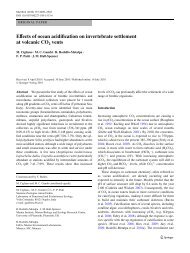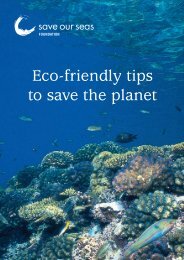South Africa's White Shark cage-diving industry - Save Our Seas ...
South Africa's White Shark cage-diving industry - Save Our Seas ...
South Africa's White Shark cage-diving industry - Save Our Seas ...
You also want an ePaper? Increase the reach of your titles
YUMPU automatically turns print PDFs into web optimized ePapers that Google loves.
<strong>South</strong> Africa’s <strong>White</strong> <strong>Shark</strong> <strong>cage</strong>-<strong>diving</strong> <strong>industry</strong> -<br />
is their cause for concern?<br />
contravene current permit regulations prohibiting intentional feeding of sharks. On<br />
rare occasions, indications of positive conditioning have been observed at Mossel<br />
Bay (four sharks). Evidence exists that adherence to permit regulations and<br />
infrequent or no feeding of sharks does not promote conditioning, and may in fact<br />
cause sharks to temporally ignore chumming vessels.<br />
� It is highly improbable that the 'conditioning of sharks' to a <strong>cage</strong> <strong>diving</strong> vessel would<br />
increase danger to human water users such as swimmers, surfers, scuba divers and<br />
kayakers. This is due to visual and olfactory dissimilarity of these humans to the<br />
conditioned neutral stimulus (i.e. the <strong>cage</strong> <strong>diving</strong> vessel and associated structures).<br />
However, even if the public perceive an ‘increase in danger’, this will have a negative<br />
effect on the (1) conservation status of white sharks in <strong>South</strong> Africa, (2) the perceived<br />
safety of beaches in the Western Cape, and (3) the long term viability of the <strong>cage</strong><br />
<strong>diving</strong> <strong>industry</strong>.<br />
� Conditioning controversy remains relevant due to some operators contravening<br />
permit conditions and intentionally feeding sharks. This state has arisen due to<br />
operators working in a consequent free environment where client expectation is high.<br />
The failure of DEAT to timely issue permits has exacerbated the non-compliant<br />
environment. Recent action by DEAT with regard to extreme contraventions of<br />
regulations (e.g. chumming adjacent to swimming beaches), must be extended to<br />
include all breaches of permit conditions, including the intentional feeding of sharks.<br />
Citation: Johnson R and A Kock. 2006. <strong>South</strong> Africa’s <strong>White</strong> <strong>Shark</strong> <strong>cage</strong>-<strong>diving</strong> <strong>industry</strong> - is their cause for<br />
concern? In Nel DC & Peschak TP (eds) Finding a balance: <strong>White</strong> shark conservation and recreational safety in<br />
the inshore waters of Cape Town, <strong>South</strong> Africa; proceedings of a specialist workshop. WWF <strong>South</strong> Africa Report<br />
Series - 2006/Marine/001.<br />
Pg 41<br />
ANNEXURE 1






